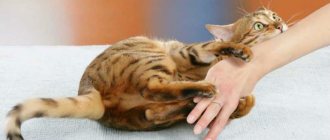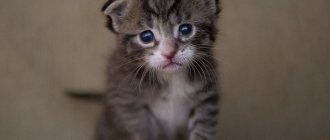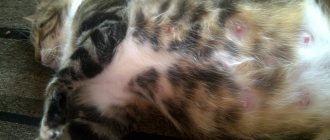Cats are unique pets. Everyone knows that these animals express their affection very reservedly towards their owners. However, breeders and experienced cat owners who have experienced the birth of kittens often describe cats separated from their babies as feeling restless and even sad. So, does a cat really miss her kittens, or do we attribute purely human feelings to our pet?
How quickly do cats forget their kittens?
Cats are some of the most caring mothers you can find in nature. They carefully look after the kittens for a long time, always purring soothingly, teaching them and protecting them from all sorts of dangers. But this wonderful time passes, and the animals simply do not recognize each other. Many owners are surprised and do not understand why a loving cat cannot recognize her own cubs in kittens. There are several reasons for this.
The main factor is the removal of kittens from the cat. Once this happens, the “forgetting process” will begin.
If a person receives 95% of information through the organs of vision, then for cats this ratio is somewhat different. Pets have a well-developed sense of smell, which allows them to easily navigate the world of smells. Most people know that animals recognize their territory, their owner, not by appearance, but by smell. a cat rubs against some object and thereby leaves a mark for itself and other animals: “I am familiar with this” or “this belongs to me.”
According to breeders, the optimal age for weaning kittens from a cat is 10-12 weeks. Therefore, for the first three months, the cat family spends time together. A box, a rug, a couch, a bed - any place that a cat chooses for herself and her cubs acquires a special smell. This smell creates a feeling of friendliness and safety in pets and allows them to recognize each other. Of course, cats can communicate through more than just their sense of smell. For a cat, her kitten's meow is unique. These animals have excellent hearing, so one cry from a kitten is enough for the mother cat to come to the rescue.
If humans do not interfere, the cat family can persist for several years. Mother cats even bring food for their adult offspring and purr for them. In the wild, big cats often stay with their “daughters”, while males leave the family and go in search of new territories. And young females help during the hunt and take care of the future descendants of their mother. By the way, something similar can be found in domestic cats, but this is not typical for them.
If the kitten is nevertheless taken away from the mother cat, she quickly forgets about her offspring. As soon as small animals leave the house, their fur will acquire a different smell that will be completely unfamiliar to the cat. 1-2 weeks after separation, the pets will not be able to recognize each other and will not remember that they are connected by family ties. And as mentioned earlier, cats trust their own nose more than their eyes.
Of course, for the mother cat this does not pass as completely as it might seem. For several days after separation from the cubs, the animal remains in an excited state, looking for kittens throughout the house. Then the cat returns to the normal lifestyle that it led before the birth of its offspring. The kittens themselves can also experience short-term stress, accompanied by loss of appetite and depression.
Source
Duration of information storage
Experiments with cats and other animals made it possible to identify 2 types of memory in them:
Short-term. This mental function allows you to perceive any events, but retains information for only a short time (no more than 27 seconds). If the event is not repeated, then the “record” loses its relevance and is erased under the influence of a new piece of information - this is how the brain protects itself from overload and “cleanses itself.”
Long-term. The long-term “imprint” of events is very selective, but resistant to influences that destroy short-term memory
This mechanism records a single phenomenon or incident that is of increased importance for an individual and stores it for a long time. This is why long-term memory in animals is called “specialized memory.”
Do cats remember their kittens?
How carefully we preserve any memories of our children! We take care of everything connected with them, from an ultrasound scan and a tag from the maternity hospital to children's drawings, notebooks and diaries from the first to the eleventh grade. Subconsciously, we expect the same trepidation from all other mothers, including those with mustaches and tails.
Who is calling?
By the way, many people use the ability of cats to recognize a familiar voice to maintain a connection with their pet at a distance.
Calling from afar, they ask you to put the phone receiver to the cat's ear and say various endearments to your pet. Many cats clearly understand who is talking to them, listen, rub against the phone and meow in response. And some even run to the phone for every call.
Mother cats: healthy instincts
But does a cat remember her kittens all her life? A positive answer will be given only by those who unreasonably reward animals with human feelings and emotions. Of course, the vast majority of cats are wonderful mothers who devote all their strength to caring for their babies, and often risk their lives to save their offspring from danger. But, alas, at these moments the murkas are guided only by instinct and nothing else.
And the same instinct tells the cat that kittens need her care not throughout their lives, but only for a few months. It is believed that by 12 weeks a good mother will give the kitten everything it needs - both a sufficient amount of her healthy milk and skills that will be useful in life. From this age, the kitten can live independently in a new family.
General information
The second part of the experiment tested long-term memory. The bowls were also demonstratively hidden, but the cats were allowed into the room only after 24 hours. The result was not so good in terms of how many cats remembered everything. Some of them ran towards the stern, still confidently. Some of the experimental subjects sniffed the shelter and looked for food. And some of the cats showed no interest in the search at all.
The conclusion from this study is simple - cats have short-term memory in the vast majority, but long-term memory is not observed in all individuals of the species. Therefore, you can judge what kind of memory a cat has over time only by looking at each individual cat.
INTERESTING: in cats, their ability to remember decreases with age in the same way as in a person or dog. The mechanisms of both long-term and short-term memory suffer.
Cats and adult kittens: rivals?
If there is no need for separation, the cat continues to live with the children until they are six months old. The mother cat ceases to perceive a sexually mature individual as her child. Yesterday's kitten becomes a rival - an unnecessary contender for territory and food, and during the period of sexual heat - a potential partner, because cats are unknown to the norms of human morality.
Of course, cats do not always quarrel with their former kittens: often in homes, especially among professional breeders, representatives of several generations of the cat family coexist quite peacefully. Do cats remember their kittens in this case, do they sense related blood? Of course not. The guarantors of peace and harmony in this case are a well-fed life, good care and a sufficient amount of master's love.
Who are we to our cats?
We consider mustachioed animals to be members of the family, but, alas, they do not share our family feelings. For a cat, a gentle “mummy” is just a giant, but not hostile cat, with whom you have to share territory.
No matter how much we pamper our pets, they still remain not completely tamed. Anthrozoologist John Bradshaw, author of The Secret Life of Cats on BBC Two , argues that cats (even the most purebred ones!) are much closer to their wild ancestors than dogs, and are not so attached to humans.
Their emphasized independence is explained quite simply: a person has never particularly strived to achieve mutual understanding with a cat. All that was required of her was to protect the house from mice and rats, and for this she was allowed to lie by the fire. It didn’t even occur to people to feed cats on purpose - why, after all, they get their own food!
So there is nothing strange in the fact that they do not feel sincere affection for us. Despite the fact that cats have lived side by side with us since time immemorial, they still walk on their own.
“The years passed. The storm is a rebellious gust..."
But will the cat remember the person in a year? Here it all depends on how big a role your pet has assigned to you in his life.
Cats' memory for people is selective and records only what is vital for the animal - both with a plus and a minus sign.
For example, the owners of one mustachioed dog, who had undergone some very unpleasant procedures at the veterinary clinic, a year later invited Aibolit, who treated the pet, to their home. Over the past period of time, the doctor and the patient have never seen each other. And it was very funny for everyone to watch how, upon seeing the “offender,” the cat, on its belly, tried to quietly leave the corridor where, according to tradition, it had gone out to greet the guest.
And another cat, fed from a nipple by a teenage boy, immediately recognized his savior in the brave soldier who had returned from the army. The cat's joy, they say, knew no bounds, although two years have passed since the separation.
Do cats remember their kittens?
1:502 1:507 How carefully we preserve any memories of our children!
We take care of everything connected with them, from an ultrasound scan and a tag from the maternity hospital to children's drawings, notebooks and diaries from the first to the eleventh grade. Subconsciously, we expect the same trepidation from all other mothers, including those with mustaches and tails. How do they feel blood ties? 2:1649 2:4 2:76 3:580 3:585 But does a cat remember her kittens all her life? A positive answer will be given only by those who unreasonably reward animals with human feelings and emotions.
Of course, the vast majority of cats are wonderful mothers who devote all their strength to caring for their babies, and often risk their lives to save their offspring from danger. But, alas, at these moments the murkas are guided only by instinct and nothing else.
And the same instinct tells the cat that kittens need her care not throughout their lives, but only for a few months. It is believed that by 12 weeks a good mother will give the kitten everything it needs - both a sufficient amount of her healthy milk and skills that will be useful in life. From this age, the kitten can live independently in a new family.
4:584 4:589
If there is no need for separation, the cat continues to live with the children until they are six months old. The mother cat ceases to perceive a sexually mature individual as her child.
Yesterday's kitten becomes a rival - an unnecessary contender for territory and food, and during the period of sexual heat - a potential partner, because cats are unknown to the norms of human morality.
Of course, cats do not always quarrel with their former kittens: often in homes, especially among professional breeders, representatives of several generations of the cat family coexist quite peacefully.
Do cats remember their kittens in this case, do they sense related blood? Of course not. The guarantors of peace and harmony in this case are a well-fed life, good care and a sufficient amount of master's love.
5:943 5:948
However, nature, as always, arranged everything in the best possible way. Imagine what it would be like for the unfortunate kitty who remembered and loved all the kittens she ever gave birth to? After all, the official cat-mother (heroine named Dusty) gave birth to more than 400 babies! Yes, her heart would burst from worries and worries.
And this is how cats love us most and remember us, their owners, best of all. It’s easier for cats, and, whatever one may say, it’s nice for us!
Svetlana Mosolova 5:248 5:253
6:757 6:762
Learning ability
A caring owner is concerned not only with the question of what kind of memory cats have, but also whether it can be trained in order to increase the mental abilities of the pet. As zoologists assure, this is not necessary, since the kitten is taught all the necessary skills by its mother. When living together with an adult in the same house, he will observe and learn from her. If the kitten was weaned from its mother early, it will still learn the skills necessary for life, but at the level of its own instincts. If a person still needs to influence this natural process, then this can be done in several ways.
- Add more vitamins to your pet's diet.
- In addition to food, give natural products, in particular fish and meat.
- Carry out training on your own, for example, moving a bowl or bed to a new place, and then check how quickly the individual gets used to the new conditions.
- You can let the kitten out for a walk and see if he finds his way home on his own, but at this time you need to carefully monitor him so that he does not get lost.
According to zoologists, the optimal age of an animal for memory development is 2–5 years.
Why then do they bring us prey?
Yes, that’s right, many cats drag strangled mice and birds into the house, and sometimes (oh, horror!) put them in their owners’ beds . However, make no mistake: they are not doing this at all to treat us. Don't forget, they are predators! The cat brings its prey to a safe place to eat it later. He probably guesses that we don’t eat that kind of stuff.
Again, there are cases where completely domestic cats hid meat stolen from the kitchen in secluded corners. Believe me, they had no intention of sharing it!
Stories about a cat's memory
There are many stories about the incredible capabilities of a cat's memory. Here are just two of them:
- A cat named Karim lived in Uzbekistan. When he was already 9 years old, his owner’s family decided to move to Russia. The long journey might have been beyond the strength of the middle-aged animal, and it was decided to leave it in Gulistan. However, Karim did not want to part with his loved ones. After 20 months, having covered 3 thousand km, he found his owner Ravilya at the market in Liski, Voronezh region.
- A 13-year-old ginger cat, picked up in a parking lot, was taken to an American veterinary clinic with kidney failure. He was treated and left in the facility. Three years later, a man and a girl—father and daughter—came into the same clinic and were struck by the resemblance of the saffron milk cap to their cat Tuffo, who had disappeared during the move. Seeing the people, the mustachioed old man jumped over the table separating them. The man, to make sure that it was really Tuffo, brought his second pet to the clinic, with whom the missing cat was familiar. After a joyful meeting, Tuffo was taken back to his family.
The fact that cats have both short-term and long-term memory is evidenced by the very existence of Yuri Kuklachev’s Cat Theater. Mustachioed performers have been delighting audiences for years with tricks they couldn't learn if they didn't have the ability to memorize.
Will an older cat recognize its mother and brothers and sisters after they were separated in childhood?
Most likely he will find out. Cats generally have excellent memory by the standards of predators, worse than dogs, but still (Note 11/18/16: By the way, I recently learned that cats have better than dogs - so...). Cats manage to remember people by smell, what can we say about their relatives?
Read more about domestic cats. From the fact that a cat-daughter and a cat-mother can be in chronic conflict relationships, and a cat-son can regularly mate with both his mother and even his great-grandmother, it does not follow that all the animals described above are not aware of their relationship.
Firstly, when a kitten grows up, the mother cat, in principle, ceases to have maternal feelings for him. She is going into heat and is planning a new litter of kittens. The cat-daughter becomes a direct competitor, the cat-son becomes low-ranking and potentially weak, and also a relative (i.e., by default, a less attractive partner), and the mother tries to drive the offspring away from her, no matter what gets in the way. But if it suddenly turns out that there is only one male, albeit a relative, and there is enough territory and food for several females, and the daughter and mother themselves managed to become friends and, in principle, the animals are not conflicting, then they can all exist together.
But cats living in colonies are usually grouped together based on the principle of kinship - usually all more or less adult males in the colony are descendants of local females, there are just so many young people and they are so “harmless” that they don’t have time to drive them all out. Foreign males trying to mark the territory belonging to the “colonists” are usually driven away. Perhaps it is also due to the specific smell of the marks, which is similar to close relatives and does not cause rejection.
With very limited food sources and territory, the oldest and strongest females actually control everything. Younger females usually “attack” to their mothers, as do low-ranking weak males, who may not be allowed to breed anyway. But strong males from outside visit and mate with local females, sometimes also beating local weak cats and killing other people’s kittens.
Now about incest, or rather, inbreeding - I don’t think that for cats this moral problem, in general, is as acute as for people. A cat can give birth to several dozen kittens during her life, most of which will die without leaving offspring. Why is incest dangerous for people? Humans have a different reproductive strategy. Each human child is 9 months and a huge amount of resources, not to mention the risk for the mother. A negative mutation enshrined in the genes of a sibling/child and mother will most likely be passed on to the child, and so on, until all children are born with the defect. And they will nurse each child, spend energy on him, and then take him and die, or suddenly it turns out that he can no longer give birth to a healthy one, even from someone else’s. It's different for cats. Weak kittens will die anyway, and the cat will give birth to others instead. At the same time, mating with a strong relative will make it possible, with a high degree of probability, to give birth to kittens in whose genes strong traits are enshrined, as well as her “own” smell. Of course, it’s not as cool as offspring from a stranger, but without fish it’ll do just fine. So I think there is simply no evolutionary need for cats to develop a strict instinctive prohibition against inbreeding. But in normal life the principle “a son is still weaker than a stranger” and “a young alien female is more accessible than a mother” works.
Those. As a result, we return to an important ethological principle that animal lovers always forget about - one cannot transfer the peculiarities of human perception and human values to animals.
Out of sight, out of mind?
But it also happens differently. It seems that the cat was kindly treated by the person and even felt sad for him at first, but years later he pretends that he doesn’t know him. “Pulking!” - people think, attributing human feelings to a cat.
In fact, over the past time, another owner has taken on the role of breadwinner, drinker and protector, and the animal’s memory has erased unnecessary information about what happened before. The returning cat will take him back to his place - and after a while he will get used to him again.
Let’s make a reservation once again - these rules apply to most cats, but each case is individual. In general, when getting an animal, you need to understand the full extent of the responsibility that you take on, and try to avoid situations that can result in enormous stress for both of you. As they say, don’t part with your loved ones!
Svetlana Mosolova
Cats are mysterious creatures. If everything is clear about their internal structure, then such an abstract concept as memory raises many questions among people. Do they have such a property? What kind of memory do cats have? How does it work? How many days, months or years is it designed for? How many events and people can a cat remember? Can she forget her home and owner after a long separation?
But do they even know what their names are?
But of course! Researchers at the University of Tokyo found that cats react to their name more actively than to other sounds of the human voice: they move their ears or tails, turn their heads, sometimes even “respond” by meowing. However, there is an important nuance: this only happens if the cat’s name is pronounced by the owner. Or rather, “he-who-gives-food.”
Most likely, this sound vibration is associated for them with the expectation of pleasure. If you have several cats, you've probably noticed: as soon as you call one, they all come running. Or none. Because they don't want to. In fact, cats remember commands no worse than dogs, it’s just not beneficial for them to show their owners that they have learned something.
Learning ability
Learning is inextricably linked with memory and is based on the adaptive mechanism of acquiring and assimilating information. In everyday life, domestic cats remember the algorithm of actions and marker words if they are repeated a certain number of times and lead to the same result. So, at the word “eat”, the cat runs into the kitchen with a purr and takes a position near the bowl. The sight of a familiar box of food or the rustling sound of a treat inside has a similar effect.
It is much easier to develop skills in young cats (up to 3 years of age), and most often pets learn passively, simply by watching how a person opens a door or from which shelf they take out a treat. This is how kittens learn the behavioral elements of adult life from their mother.
Recipes for success.
The minimum number of repetitions required to transfer information about an event of little significance to a cat into long-term memory is 5.
You can achieve results in training by instilling a consistent interest in activities and based on the cats’ innate craving for hunting, playing and getting food.
When performing tricks, the individual talents of the animal are of great importance: for example, the tendency to carry various objects in its teeth or boldly overcome obstacles. Even a minor result should be positively reinforced, forming an increasingly stable connection between neurons. In turn, any negative influence is ineffective in training cats, causing fear and rejection of humans.
Freedom-loving cats still keep many unsolved mysteries, charming and delighting their owners every day.










